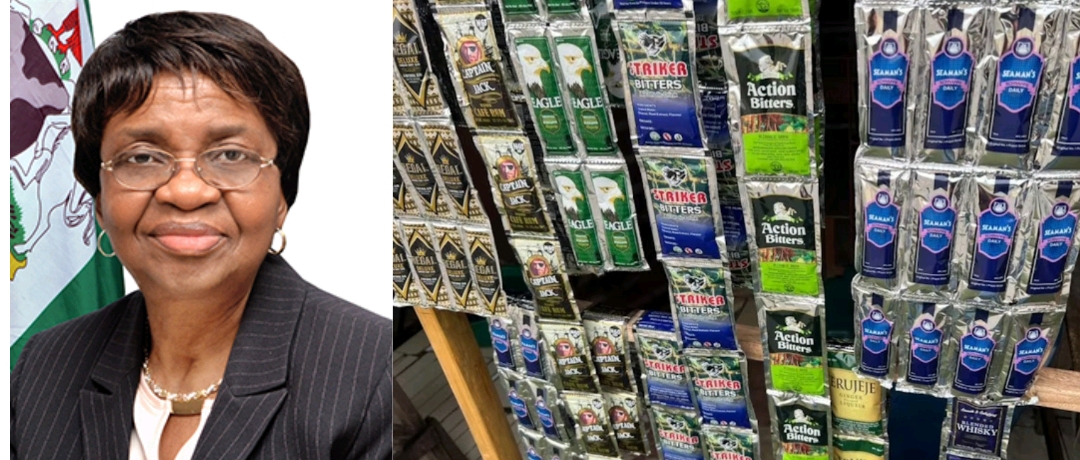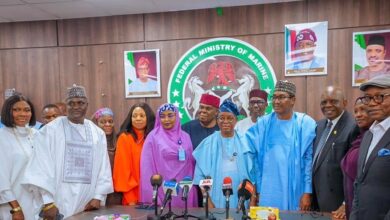
With just weeks to the enforcement of the National Agency for Food and Drug Administration and Control (NAFDAC)’s ban on alcoholic beverages sold in sachets and small bottles, two major public health organisations—Network for Health Equity and Development (NHED) and Corporate Accountability and Public Participation Africa (CAPPA)—have come out strongly in support of the policy, describing it as a necessary step to protect vulnerable Nigerians from alcohol-related harm.
In a joint statement issued on Sunday, the organisations said the ban, which covers sachets, PET bottles and glass bottles of 200ml and below, was long overdue given the increasing accessibility of high-strength alcohol to children and young people. The ban, announced in 2024, enters full enforcement in December 2025 after a multi-year phase-out period that manufacturers were expected to follow.
However, according to NHED and CAPPA, some manufacturers continued producing the outlawed products despite the deadline—an action the groups say undermines public health and regulatory authority.
The controversy intensified after the Manufacturers Association of Nigeria (MAN) warned that the ban could trigger job losses and erode investment. But NHED and CAPPA insist the claims are inflated, dismissing them as part of a well-worn global strategy by alcohol and tobacco companies to resist regulation.
The organisations argued that production of sachet alcohol is largely mechanised and requires minimal human labour, making claims of mass retrenchment unrealistic.
“We reject in its entirety the claims by MAN that the ban will lead to over ₦1.9 trillion in investment losses and 500,000 job cuts,” the statement said. “These figures are unverifiable and represent a familiar scare tactic used by corporations to pressure governments into placing profits over public health.”
They accused manufacturers of weaponising economic misinformation instead of engaging with evidence-based policies.
Dr. Jerome Mafeni, Technical Director of NHED, said the real cost to Nigeria lies not in the claims of manufacturers but in the lives disrupted or destroyed by alcohol misuse.
“It’s unacceptable that children can buy high-concentration alcohol for as little as ₦100,” Mafeni said. “Nigeria is already dealing with increased violence, addiction among young people, rising healthcare costs, and reduced productivity. These harms fall disproportionately on poor and marginalised communities—communities that sachet alcohol marketing has consistently targeted.”
He stressed that no amount of short-term profit could justify the long-term social and economic burden the country faces.
Akinbode Oluwafemi, Executive Director of CAPPA, applauded NAFDAC for what he described as resilience in the face of corporate intimidation.
“NAFDAC’s decision mirrors global best practices. No responsible government permits the widespread sale of alcohol in packaging designed to encourage underage and on-the-go drinking,” he said.
Oluwafemi urged other government agencies—the Federal Ministry of Health, Ministry of Finance, Standards Organisation of Nigeria (SON) and National Orientation Agency (NOA)—to close ranks and support NAFDAC to ensure seamless enforcement of the ban.
The organisations also appealed directly to President Bola Ahmed Tinubu and the National Assembly to resist industry pressure and avoid any move to suspend or water down the policy.
“The well-being of more than 200 million Nigerians must not be sacrificed at the altar of corporate profit,” they said.
Beyond the ban, NHED and CAPPA called for stronger alcohol control measures such as increased taxation, stricter marketing regulations to protect children, clearer product labelling, and nationwide sensitisation campaigns.
As December approaches, the organisations maintain that the benefits of enforcement far outweigh the economic arguments put forward by manufacturers. They insist the ban is a critical step toward reducing the health, social and economic toll of alcohol misuse.
“NAFDAC’s ban is the right policy at the right time,” they said. “NHED and CAPPA stand with the agency and with all Nigerians committed to building a healthier and safer society.”












Điểm nổi bật của 66b mới nhất không chỉ nằm ở giao diện thân thiện, tốc độ xử lý mượt mà trên cả điện thoại và máy tính, mà còn ở công nghệ bảo mật tiên tiến, giúp người dùng yên tâm sử dụng dịch vụ mọi lúc mọi nơi. Đặc biệt, deegarciaradio.com hoạt động hợp pháp dưới sự cấp phép của tổ chức PAGCOR – Philippines, đảm bảo yếu tố minh bạch và ổn định trong quá trình vận hành.
Nhà cái uy tín tải 888slot không chỉ nổi bật ở sự đa dạng dịch vụ mà còn được đánh giá cao nhờ vào hệ thống vận hành ổn định và uy tín được xây dựng qua nhiều năm. Nhờ có giấy phép hợp lệ từ Curacao eGaming cùng sự giám sát chặt chẽ từ PAGCOR, trang này ngày càng khẳng định được vị thế trong lòng người chơi toàn cầu.
66b app Trên các bảng xếp hạng uy tín như AskGamblers và iGamingTracker, nhà cái thường xuyên góp mặt trong danh sách những nhà cái có tỷ lệ giữ chân người chơi cao nhất.
Bạn đang tìm kiếm một địa chỉ giải trí cá cược trực tuyến uy tín, minh bạch và đầy hấp dẫn? Hàng triệu khách hàng người chơi đã đưa ra câu trả lời: 888slot apk! Vậy điều gì đã khiến 888slot apk trở thành lựa chọn hàng đầu và nhận được vô vàn đánh giá tích cực từ khách hàng?
asia slot365 login Một số trò chơi nổi bật tại nhà cái được cập nhật phải kể đến như Pubg, liên minh huyền thoại, CS:GO, FIFA, DOTA 2,….Mỗi trận đấu luôn được các chuyên gia nhà cái phân tích và đưa ra để anh em có cơ hội vào những kèo cược ngon, nâng cao cơ hội chiến thắng.